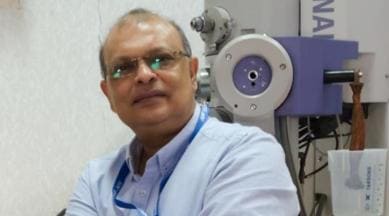Lifetime achievement award for Pune NIV scientist Professor Atanu Basu
Professor Basu who heads the electron microscopy and pathology division at ICMR-NIV has been instrumental in setting up the country’s first dedicated virus electron microscopy and cryo-electron microscopy facilities.

Professor Atanu Basu, scientist at the Indian Council of Medical Research – National Institute of Virology (ICMR-NIV), Pune, has been selected for the lifetime achievement award for his outstanding contributions in the field of electron microscopy in studying viruses.
The award will be presented to the scientist on February 9 at the annual conference of the Electron Microscopy Society of India (EMSI) to be held at the University of Delhi.
monthly limit of free stories.
with an Express account.
Professor Basu who heads the electron microscopy and pathology division at ICMR-NIV has been instrumental in setting up the country’s first dedicated virus electron microscopy and cryo-electron microscopy facilities that has given the nation pioneering capabilities in rapid virus morpho diagnosis and imaging technologies for probing virus-host interactions. “Such applications are crucial for both early detection of viruses in outbreak and pandemic modes as well as characterise their structure and properties that are crucial to vaccine and therapeutic development,” Dr Basu told The Indian Express adding this was the highest honour in the field.
The Electron Microscopy (EM) facility at ICMR-NIV helped in the discovery of novel human viruses like the Chandipura virus and characterised how the pandemic H1N1 influenza virus damaged lungs. The facility is one-of-its-kind in the country. It has put India on the international map for virus electron microscopy and is a key global reference in the external quality assessment laboratory for virus morpho diagnosis in collaboration with the Robert Koch Institute of Germany.
During the recent Covid-19 pandemic, the ICMR-NIV was the first laboratory in India to detect and characterise in detail the morphology of the SARS-CoV-2 virus. This played a pivotal role in the subsequent vaccine development and quality control through high-throughput imaging.
Electron microscopy played a very important role in supporting the preclinical studies of early Covid-19 vaccine development and understanding the pathology of the disease, Dr Basu said.
Subsequently, ICMR formed the ICMR Electron Microscopy Consortium (IEMC) to pool resources of all ICMR Electron Microscopy laboratories in diverse areas of biomedical research as a national resource. The network, now in an advanced stage of deployment, will provide EM facilities to all researchers in different parts of the country.
Apart from being a teacher and a scientist, Professor Basu is also an artist who loves to capture nature with electron microscopes and his sketch pen.